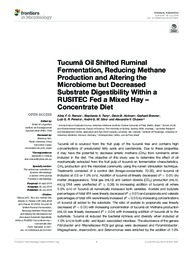Tucumã oil shifted ruminal fermentation, reducing methane production and altering the microbiome but decreased substrate digestibility within a RUSITEC fed a mixed hay - concentrate diet.
Tucumã oil shifted ruminal fermentation, reducing methane production and altering the microbiome but decreased substrate digestibility within a RUSITEC fed a mixed hay - concentrate diet.
Author(s): RAMOS, A. F. O.; TERRY, S. A.; HOLMAN, D. B.; BREVES, G.; PEREIRA, L. G. R.; SILVA, A. G. M.; CHAVES, A. V.
Summary: Abstract Tucumã oil is sourced from the fruit pulp of the tucumã tree and contains high concentrations of unsaturated fatty acids and carotenoids. Due to these properties it may have the potential to decrease enteric methane (CH4) from ruminants when included in the diet. The objective of this study was to determine the effect of oil mechanically extracted from the fruit pulp of tucumã on fermentation characteristics, CH4 production and the microbial community using the rumen stimulation technique. Treatments consisted of a control diet (forage:concentrate; 70:30), and tucumã oil included at 0.5 or 1.0% (v/v). Addition of tucumã oil linearly decreased (P < 0.01) dry matter disappearance. Total gas (mL/d) and carbon dioxide (CO2) production (mL/d, mL/g DM) were unaffected (P ≥ 0.36) to increasing addition of tucumã oil where 0.5% (v/v) of Tucumã oil numerically increased both variables. Acetate and butyrate percentages of total VFA were linearly decreased (P ≤ 0.01) and propionate and valerate percentages of total VFA were linearly increased (P < 0.01) by increasing concentrations of tucumã oil added to the substrate. The ratio of acetate to propionate was linearly decreased (P < 0.01) with increasing concentration of tucumã oil. Methane production (mL/d) was linearly decreased (P = 0.04) with increasing addition of tucumã oil to the substrate. Tucumã oil reduced the bacterial richness and diversity when included at 1.0% (v/v) in both solid- and liquid- associated microbes. The abundance of the genera Fibrobacter and Rikenellaceae RC9 gut group were decreased and Pyramidobacter, Megasphaera, Anaerovibrio, and Selenomonas were enriched by the addition of 1.0% tucumã oil. In conclusion, tucumã oil resulted in the favorable shift in fermentation products away from acetate toward propionate, decreasing the production of CH4 when tucumã oil was included at 1.0% (v/v), however, substrate digestibility was also inhibited. The rumen microbiota was also altered by the addition of tucumã oil.
Publication year: 2018
Types of publication: Journal article
Unit: Embrapa Dairy Cattle
Observation
Some of Embrapa's publications are published as ePub files. To read them, use or download one of the following free software options to your computer or mobile device. Android: Google Play Books; IOS: iBooks; Windows and Linux: Calibre.
Access other publications
Access the Agricultural Research Database (BDPA) to consult Embrapa's full library collection and records.
Visit Embrapa Bookstore to purchase books and other publications sold by Embrapa.

